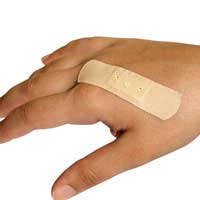Survival First Aid

The first thing to remember in a survival situation when it comes to illness or injuries is to ensure that you have a first-aid kit ready to hand and that you know how to use it. Granted some people may be more ill or injured than you could ever have bargained for and in a survival situation where you may have no easy access to emergency services, all you can do is stay calm, keep a clear mind, offer reassurance and do the best you can with the tools and equipment you have at your disposal.
First Things First
Make sure that the most qualified person in first aid skills is ‘appointed’ as the person to take charge. There’s no benefit to the casualty of someone wishing to become ‘the hero’ and, even though it’s sometimes useful to gauge opinion from others, time can be vital when treating a casualty so it’s important that someone takes overall control. Hopefully, this is something that you decide BEFORE finding yourself in a survival situation.The next thing you must do is to assess the injury or illness. Look around and try to establish what might have caused the injury or illness and if you can identify that, make sure the cause does not remain a threat to yourself or anybody else before treating the casualty, if this is appropriate.
Secondly, you need to establish whether the illness or injury is life-threatening or not. Check the victim’s breathing and pulse and ensure that they are not in danger of choking. A good way of remembering this is ABC…airway, breathing, circulation. Then, determine whether there may be any neck or spinal injuries and if you suspect there might be, do not move the victim. Keep them comfortable and warm in the same position as you found them, unless it’s unsafe to do so.
Shock
Although some casualties may only have superficial injuries, you need to watch out for signs that they are suffering from shock. Pale skin and lips which are cold or clammy, increased breathing rate, severe thirst, vomiting, restlessness, confusion and a rapid but shallow pulse rate are all warning signs. As shock takes hold, it can cause unconsciousness or the victim might seem to stare vacantly or show no response or seem to have no interest in what’s going on. If you suspect shock, you need to reassure the casualty and cover them up to keep them warm, protecting them from the elements.If you’re confident that the casualty has not suffered any neck or spinal damage, you should lie them down, if they are not doing so already, and elevate their feet about a foot and loosen all clothing to increase blood circulation. At this stage, you should not offer them food or water in case they have other internal injuries as this could cause more damage but if they are unconscious and you’re sure they do not have any neck or spinal damage, you can then put them into the recovery position. Remember though, that you should treat major injuries first and then treat for shock.
Minor Injuries
Once you have taken all of the steps above and remedied them the best you can, then you can go about treating less serious forms of injury. Your first aid knowledge might be used to treat burns, cuts, bruises, sprains and scrapes all of which will have to be treated and cleaned to prevent infection no matter how insignificant they might seem.It’s important to remember that in a survival situation, no two emergencies are ever the same and, whilst training and experience in first aid will help you greatly and teach you the correct steps, checks and procedures to follow, only you will be able to determine the priorities until proper medical assistance can be reached.


Re: How to Get Out Of A Mud Bog (Quicksand)
I was 8 years old, my family went to visit our neighbors where we previously lived in Tool,Texas. The family had…
Re: How to Get Out Of A Mud Bog (Quicksand)
I was sinking in a mud bog yesterday for 3 hours until I was pulled out. How do I cope now?
Re: Dangers and Benefits of Leeches
Can it penetrate completely into the body through navel ? If, then how one can know that it has entered into body ? And what…
Re: How To Survive A Forest Fire
I like cheese.... ????????????????????????????
Re: Dangers and Benefits of Leeches
The easiest way to remove a leech from skin is just by sprinkling salt over the leech which would immediately detaches itself…
Re: Dangers and Benefits of Leeches
I'm 14 and was swimming st Brady's run in beaver county and I got bit by a leech.. I would of never knew unles my boyfriend…
Re: What Are Survival Seeds?
The other evening, I found all my matches were damp and I had to ignite my wood burning stove using a rolled up piece of paper and my…
Re: Where Can I Try Out my Survival Skills?
i been doing some survival practise is my back garden but i could use some new bet cheap and relieable gear. thank you
Re: Surviving in the Desert
Hi I am in the process of doing research for a novel. The main characters are trapped in a desert and there is an on coming sandstorm.…
Re: How to Start a Fire
So lets just say, I am aware this sounds crazy but hear me out, what if there was a zombie apoccolypse (Have no frickin idea how to spell…